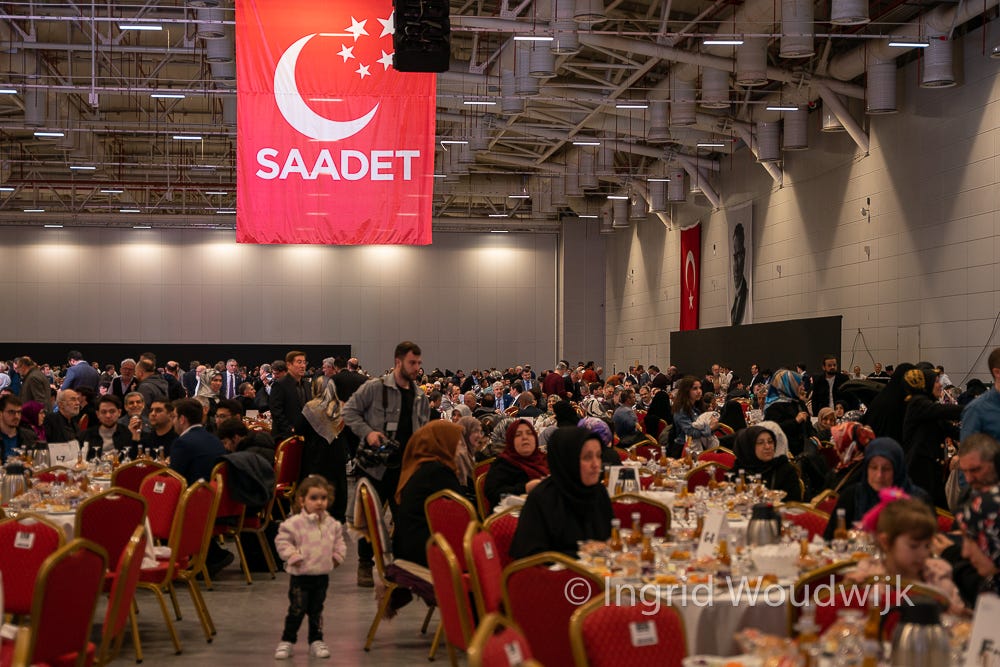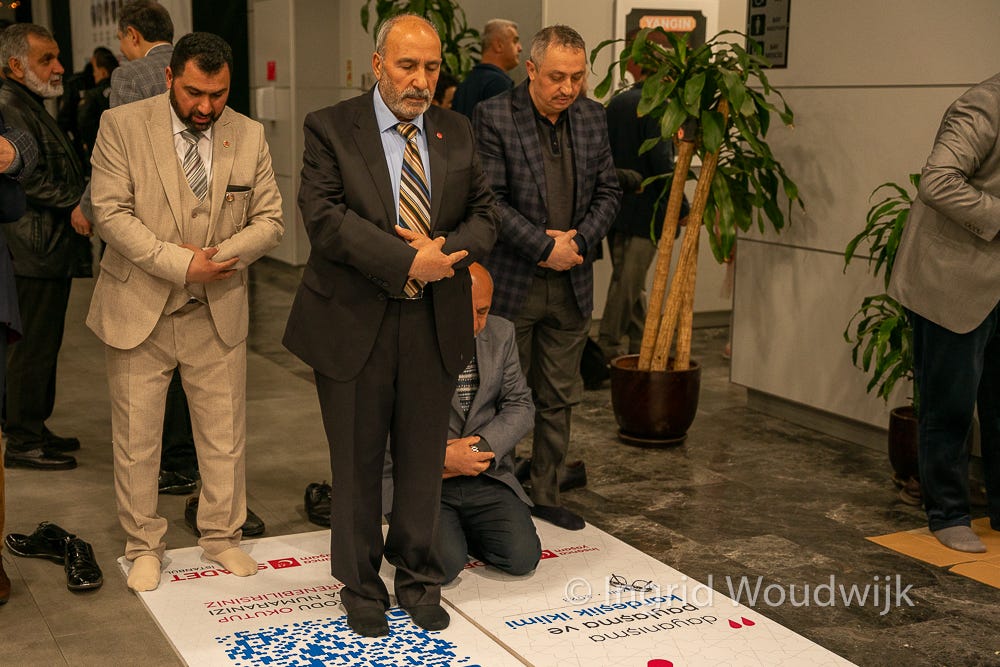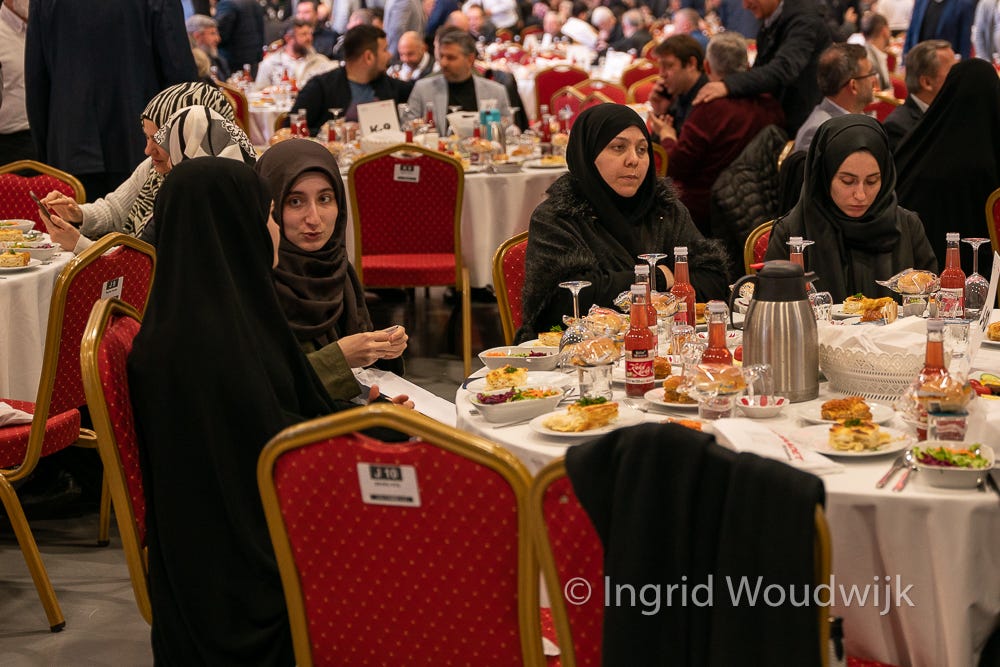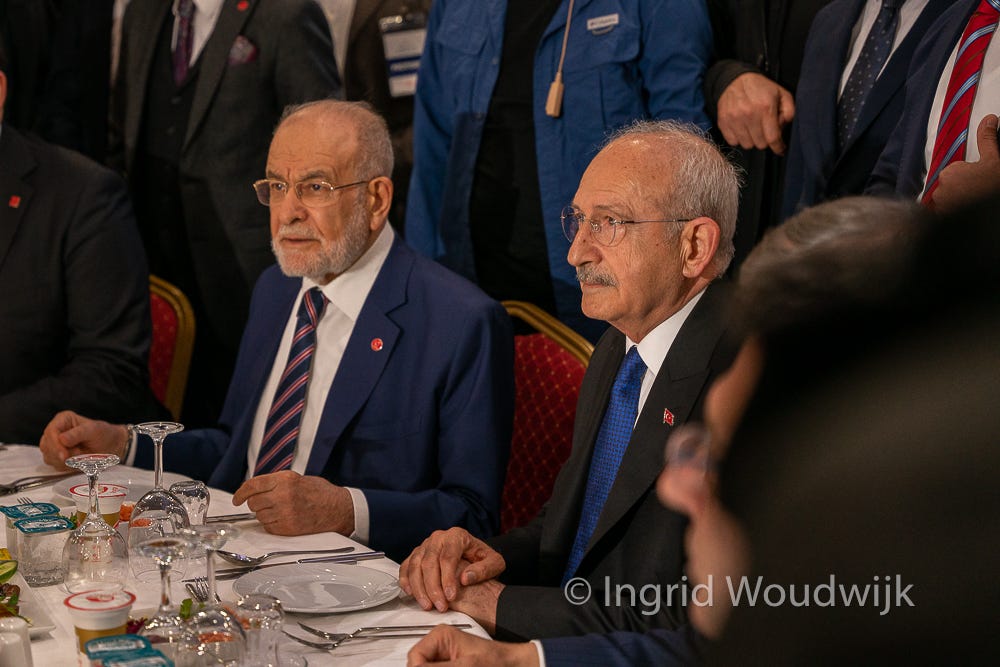
The evening of Saturday, April 1, a live call to prayer filled an event hall in Yenikapı, İstanbul, where the Islamist opposition Saadet party was hosting an iftar dinner during the holy month of Ramadan.
The prayer areas in the venue were not equipped with enough prayer rugs to accommodate hundreds conservative guests, so several men used the party’s campaign posters instead during their prayers.
In the hall, the main opposition presidential candidate Kemal Kılıçdaroğlu was also present and addressed his own prayer rug incident, which broke out a day earlier when he was pictured standing on a “seccade”, as it’s called in Turkish, with his shoes on. Since then, Kılıçdaroğlu has repeatedly apologized for the incident, which he said was not intentional.
Incumbent Pres. Recep Tayyip Erdoğan has kept the spotlight on the incident, which could prove politically hazardous for Kılıçdaroğlu’s image among conservative voters. Speaking in a TV interview Wednesday, Erdoğan said the photo showed the “CHP mentality”, implying the secular party disrespects religion.
For his part, Kılıçdaroğlu labeled some prayer rug criticism and online backlash as an “operation” to undermine his prospects at the ballot box.
Yet in interviews with Turkey recap, deeply religious Saadet voters said they accepted the opposition candidate’s apology, contradicting mainstream media rhetoric that the Kılıçdaroğlu candidacy and his background would be problematic for conservatives.
Despite ideological differences between CHP and Saadet, a joint focus on issues like the rule of law and the economy appears to unite supporters of both parties for now.
Mahmut Kılıç, deputy head of Saadet’s İstanbul branch, said he found Kılıçdaroğlu’s apology sincere. Speaking more generally, he added: “If you offended, upset or misunderstood a part of the society, ask for forgiveness (helallik) and show that you will not be in that position again. That is very valuable.”
Strong support for Kılıçdaroğlu was voiced also among lower level party members and supporters. For instance Nazmiye Gülbaş, a history teacher and active party member, said Kılıçdaroğlu’s nomination “was the right decision, we agree and support it.”
The sentiments contrast with some initial reactions. In March, just after Kılıçdaroğlu’s candidacy was announced in front of the Saadet party headquarters in Ankara, some within the party spoke out against his candidacy and the secular slogans that were chanted that day. A group calling itself the Haymana Mutabakatı Heyeti said Saadet betrayed its voters and lost its legitimacy.
While that specific group has not since made significant moves or news, a former deputy head of Saadet recently tweeted it was unthinkable to support Kılıçdaroğlu. The groups opposing Kılıçdaroğlu also say the Table of Six principles are not in line with the Millî Görüş, a religious-political movement founded by former Turkish PM and Saadet party chair Necmettin Erbakan.
In an interview today (Monday), Saadet head Temel Karamollaoğlu acknowledged the differences in his party. “Our base has different reactions. We have to take steps by taking these different reactions into account,” he told Cumhuriyet.
Back at the April 1 iftar, which was naturally attended by some of the most loyal Saadet supporters, Ahmet Polat, an active participant in the party’s youth wing, also noted there was an ideological gap between Kılıçdaroğlu and other Table of Six parties, but said it was manageable.
“Actually, Kılıçdaroğlu is someone that is completely opposite with our ideology,” Polat told Turkey recap. “But that is what makes Saadet different. We approach everyone in a just way.”
Because Kılıçdaroğlu was “a very good authority”, Polat said he supported him.
Saadet fits in the long tradition of Islamist parties in Turkey, which started in the 70s with the Millî Nizam Partisi led by Necmettin Erbakan, who then began the Millî Görüş movement mentioned above. In 2001, Saadet was born from this ideology, too, with Erbakan serving various terms as its leader.
Bilge Yabancı, Marie Curie fellow at Northwestern University and Ca’ Foscari University of Venice who researches the relationship between populism and religion, said there were distinct differences between Saadet and the ruling AKP in the early 2000s.
“Back then, Saadet was considered the representative [of the] hardcore conservative Islamist constituency while the AKP rallied not only mild conservatives, but also central right voters, liberals and some left leaning progressives, and Kurds,” she told Turkey recap.
“Saadet still has a very limited voter base – barely more than 1 percent – that self-identifies as conservative, devout Muslims but not necessarily supportive of undemocratic or Islamic law in state governance,” Yabancı added.
Roj Girasun, researcher at the Rawest survey firm, was also present at the April 1 iftar and believed Saadet was important politically, but not numerically. Their support for Kılıçdaroğlu sends a key political message showing an alliance between secularists and conservatives, he said.
Since many local representatives and other party organizations were present that evening, Girasun was convinced the party would work to support Kılıçdaroğlu.
“Quite some people claimed that, despite the support of Saadet's leader, the voters or organizations could not support Kılıçdaroğlu. I think that claim has fallen apart,” he told Turkey recap.
Another electoral benefit from the ideological diversity in the Table of Six is that the AKP will not be the only representative of conservative and Muslim Turks on voting day, Yabancı added.
“This is because the AKP has turned into a highly corrupt, clientelist and nepotistic machine that captured the state,” she said. “For many devout Muslims, this is not only illegal but also against Islamic morality.”
While broad support was voiced at the iftar, some fundamental differences can’t be overlooked between the two parties, for instance on the topics of women’s rights, LGBTQ+ rights and gender equality.
Saadet chair Karamollaoğlu recently targeted gay families and was quoted as saying: "We cannot consent to the degeneration of the concept of family. The family consists of a man, a woman and children. We do not accept how two men or two women can create a family.”
Mahmut Kılıç, from Saadet İstanbul, acknowledged the different views among the six opposition parties, but highlighted the issues they did agreed on, as in the Memorandum on Common Policies.
“There are fundamental problems in our country right now. There is a problem of justice, there is a problem of economy. There are obvious problems in many areas,” Kılıç told Turkey recap, “We need to solve those first.”
Though absent from the joint memorandum are topics like women’s rights and LGBTQ+ rights. Bilge Yabancı noted the CHP and Table of Six have been rather silent on these topics.
She said there is a belief this trend was due to the “objections of more conservative parties like Saadet, whose electoral base share similar ideas with the AKP about gender equality, divorces, abortion and LGBTQ+ rights. Only time will tell after the elections how these issues will be tackled by the opposition bloc.”
But there are more topics that unite the Table of Six than divide them, Yabancı said, beyond being anti-AKP or anti-one-man-rule.
Those stances have “substantial content, like being against the capture of the judiciary, nepotism, corruption, poor economic governance, polarization, oppression of freedom of speech and civil society and strongman politics,” Yabancı said.
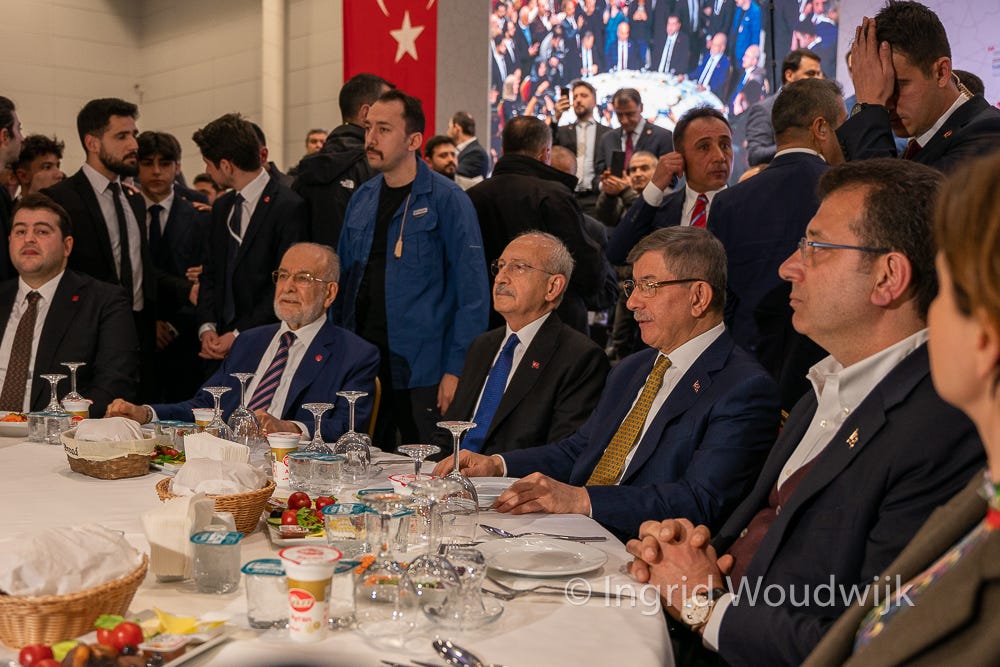
Another often cited electoral issue is the Alevi faith of Kılıçdaroğlu, which he rarely talks about. As the largest religious minority in Turkey, the community has faced a long history of discrimination and violent repression.
While many commentators have argued deeply conservative Sunnis might not vote for an Alevi candidate, Saadet supporters interviewed by Turkey recap strongly opposed this claim.
“For us, Kılıçdaroğlu’s Alevism is not a problem at all,” Nazmiye Gülbaş said, a phrase which she repeated several times.
“Our motto is morality and spirituality first. As Saadet, morality is very important, raising honest, reliable people. Rights and justice for everyone, religion, language, race, sect, gender does not matter,” Gülbaş added.
Gülbaş did not deny differences between the CHP and Saadet, but didn’t think they would create problems.
“You know, ideologically, of course, they think differently, of course we think differently. But we don't think there will be a problem as long as we don't impose [our ideology] on them and as long as they don't impose [their ideology] on us,” she said.
Gülbaş said Kılıçdaroğlu’s November 2021 “helalleşme” message was the first step towards change and it made her feel secure. The second step should be unity as a country and for people to be more tolerant of one another, she believed.
Researcher Yabancı said the helalleşme promise triggered the democratization of the CHP and its constituency.
“The CHP’s previous staunch stance aligned with state secularism started to change during Kılıçdaroğlu’s chairmanship,” she said. “I think voters who felt distant to conservative-religious segments of society have also acknowledged and embraced this change as a necessary step for reconciliation.”
She concluded Turkish voters were tired of polarization and being antagonized along ideological or religious lines, and as represented by the Table of Six, were unifying against authoritarian and corrupt structures.
“The priorities of voters are different and start with the deepening crisis and socio-economic inequality represented by high inflation and unaffordable rents in big cities,” Yabancı said.
Turkey recap is an independent platform supported by readers via Patreon and Substack. Members get access to our Slack channel, timelines, calendar and more.
We also invite you to visit our merch store, but if you simply liked what you read, subscribe here or forward it to a friend. Feedback and pitches: info@turkeyrecap.com.
Diego Cupolo, co-founder + editor @diegocupolo
Gonca Tokyol, freelance journalist @goncatokyol
Ingrid Woudwijk, freelance journalist @deingrid
Verda Uyar, freelance journalist @verdauyar
Gökalp Badak, editorial intern @gklpbdk




